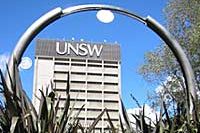Financial Economics - ECONJ13587
Stream Summary
Faculty: COMM - Australian School of Business
School: School of Economics
Contact: Australian School of Business Student Centre
Program: 3587 - Actuarial Studies (Co-op)
Award(s):
Bachelor of Actuarial Studies (Co-op) (Major)
Information valid for students commencing 2013.
Students who commenced prior to 2013 should go to the Handbook's Previous Editions
Stream Outline
Markets for financial instruments arise because some firms and individuals want to borrow while others want to save. A large corporation, for example, may borrow funds to purchase new plant and equipment by issuing further stock while an individual may save by purchasing stocks or government bonds. Markets for financial instruments also arise because firms and individuals want to manage financial risk. For example, a large corporation may bet against the risk of large fluctuations in the Australian - U.S. dollar exchange rate by selling its goods by way of futures contracts. Understanding how the prices of financial instruments are determined in the market place is a central concern of financial economics, along with the design of new financial derivatives.
The area of financial economics that deals with the study of real-world data is known as financial econometrics. Financial econometrics is concerned with the statistical analysis of financial data and testing the real-world applicability of asset-pricing theories. This major provides students with a thorough understanding of the economic principles that underlie the pricing and allocative role of all financial assets, whether they are stocks, bonds, futures or options.
Stream Structure
Please note: Economics/Law students must take 96 UOC (16 courses) consisting of the major requirements (10 courses), ECON1401 Economic Analysis, and five (5) additional elective courses (including at least 3 ECON level 2 or 3 courses) as per the BEc program.
For students who complete a Financial Economics major as part of the Bachelor of Commerce, the requirements are exactly the same. While majors in the BCom are expressed as requiring 48 UOC, in the case of the Financial Economics major this excludes ECON1101 Microeconomics 1 and ECON1203 Business and Economic Statistics (or equivalent MATH course) which are compulsory core courses in the BCom.
- ECON1101 Microeconomics 1 (6 UOC)
- ECON1102 Macroeconomics 1 (6 UOC)
- ECON1202 Quantitative Analysis (6 UOC)
- ECON1203 Business & Economic Statistics (6 UOC)
- ECON2101 Microeconomics 2 (6 UOC)
- ECON2206 Introductory Econometrics (6 UOC)
- ECON2209 Business Forecasting (6 UOC)
- ECON3107 Economics of Finance (6 UOC)
- ECON3206 Financial Econometrics (6 UOC)
- ECON3101 Markets and Public Choice (6 UOC)
- ECON3104 International Macroeconomics (6 UOC)
- ECON3106 Politics, Government and Econ (6 UOC)
- ECON3109 Econ Growth,Tech&Struct Change (6 UOC)
- ECON3110 Development Economics (6 UOC)
- ECON3114 Super and Retirement Benefits (6 UOC)
- ECON3116 International Trade (6 UOC)
- ECON3117 Retirement Saving and Spending (6 UOC)
- ECON3119 Political Economy (6 UOC)
- ECON3121 Managerial Economics (6 UOC)
- ECON3123 Economics of Corporations (6 UOC)
- ECON3124 Behavioural Economics (6 UOC)
- ECON3125 Econ of Human Capital (6 UOC)
- ECON3202 Mathematical Economics (6 UOC)
- ECON3203 Econometric Theory (6 UOC)
- ECON3208 Econometric Methods (6 UOC)
- ECON3209 Statistics for Econometrics (6 UOC)
Honours
- ECON2102 Macroeconomics 2
- ECON3104 International Macroeconomics
- One of ECON3101 Markets and Public Choice; or ECON3121; or ECON3123
Further information
Students are advised to follow requirements according to the year they commenced. Please refer to previous editions of the Online Handbook for your program requirements.
Contact the Australian School of Business Student Centre for advice.
tel: + 61 2 9385 3189
location: Ground Floor, West Wing, Australian School of Business Building
Forms, policies and procedures
Frequently asked questions









